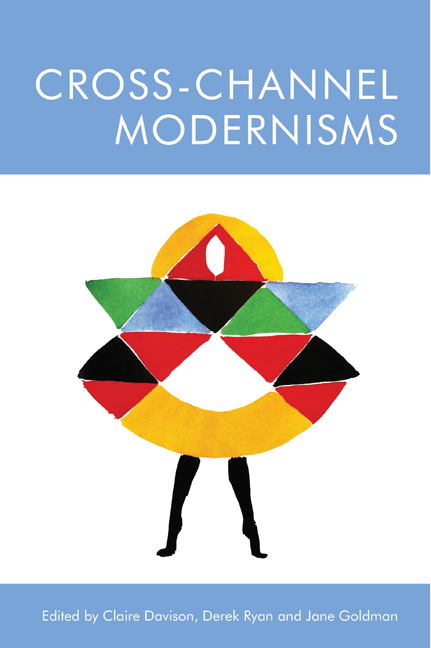Book contents
- Frontmatter
- Contents
- List of Figures
- Notes on Contributors
- Introduction: Cross-Channel (Transmanche) Modernisms
- Interlude: Translating
- 1 On Unknowing French? Rhythm and Le Rythme on a Cross-Channel Exchange
- 2 Impressions of Translation: Ford Madox Ford’s Cosmopolitan Literary Crossings
- 3 Sydney Schiff and Marcel Proust: Table-talk, Tribute, Translation
- Interlude: Fashioning
- 4 Cross-Channel Modernisms and the Vicissitudes of a Laughing Torso: Nina Hamnett, Artist, Bohemian and Writer in London and Paris
- 5 Jean Rhys’s comédie anglaise
- 6 Betray to Become: Departure in James Joyce’s A Portrait of the Artist as a Young Man
- Interlude: Mediating
- 7 Close Up and Cross-Channel Cinema Culture
- 8 Debussy at the Omega Workshops
- 9 Across the Other Channel: Elizabeth Bowen and Modernist Mediation
- Coda: ‘You, who cross the Channel’: Virginia Woolf, Departures and the Spectro-Aesthetics of Modernism 215
- Index
1 - On Unknowing French? Rhythm and Le Rythme on a Cross-Channel Exchange
Published online by Cambridge University Press: 03 October 2020
- Frontmatter
- Contents
- List of Figures
- Notes on Contributors
- Introduction: Cross-Channel (Transmanche) Modernisms
- Interlude: Translating
- 1 On Unknowing French? Rhythm and Le Rythme on a Cross-Channel Exchange
- 2 Impressions of Translation: Ford Madox Ford’s Cosmopolitan Literary Crossings
- 3 Sydney Schiff and Marcel Proust: Table-talk, Tribute, Translation
- Interlude: Fashioning
- 4 Cross-Channel Modernisms and the Vicissitudes of a Laughing Torso: Nina Hamnett, Artist, Bohemian and Writer in London and Paris
- 5 Jean Rhys’s comédie anglaise
- 6 Betray to Become: Departure in James Joyce’s A Portrait of the Artist as a Young Man
- Interlude: Mediating
- 7 Close Up and Cross-Channel Cinema Culture
- 8 Debussy at the Omega Workshops
- 9 Across the Other Channel: Elizabeth Bowen and Modernist Mediation
- Coda: ‘You, who cross the Channel’: Virginia Woolf, Departures and the Spectro-Aesthetics of Modernism 215
- Index
Summary
‘On Not Knowing French’ is a fascinating review which marked Virginia Woolf's official debut in France as a ‘femme de lettres’. Published in French on the front page of Le Figaro on 10 February 1929, three days before publication in Britain, it was a commissioned contribution which followed her being awarded the ‘Prix Femina – Vie Heureuse’ for To the Lighthouse the year before. It was Woolf's first opportunity to address an eminent French readership, demanding a theme, voice and mode of address suited to the occasion. Her essay's explicit purpose is to review Climats, a new novel by the French author, biographer, translator and staunch Anglophile André Maurois, who was then enjoying a successful literary career on both sides of the Channel. Rather than tackling the topic head on, however, the reviewer begins by reflecting on what reading and being read in translation, either side of the Channel, might mean. The opening gambit runs as follows:
One scarcely dare say it, but it is true – nobody knows French but the French themselves. Every second Englishman reads French, and many speak it, and some write it, and there are a few who claim – and who shall deny them? – that it is the language of their dreams. But to know language one must have forgotten it, and that is a stage that one cannot reach without having absorbed words unconsciously as a child. In reading a language that is not one's own, consciousness is awake, and keeps us aware of the surface glitter of the words; but it never suffers them to sink into that region of the mind where old habits and instincts roll them around and shape them a body rather different from their faces. (Woolf 2009: 5)
It is an elegantly framed, somewhat deferential preliminary statement, paying homage to a form of ‘exception culturelle française’ – a national birthright bestowing linguistic finesse, Cartesian rationality and chic refinement on the French native speaker. However much one may aspire to proficiency in the French language, or savour their literature, Woolf seems to concede, one is doomed to fall short: there is no hope of attaining native competence.
- Type
- Chapter
- Information
- Cross-Channel Modernisms , pp. 19 - 49Publisher: Edinburgh University PressPrint publication year: 2020

